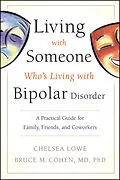An essential resource for anyone who has a close relationship
with a person who is bipolar
This book provides a much-needed resource for family and friends
of the more than 5 million American adults suffering from bipolar
disorder. From psychotic behavior that requires medication to
milder mood swings with disturbing ups and down, this book offers a
warm and often humorous user-friend guide for coping with bipolar
loved ones, colleagues, and friends. The book includes
* Guidance for identifying bipolar disorder symptoms and how to
get the diagnosis confirmed
* Strategies for dealing with rants, attacks, blame, depression,
mania and other behaviors
* Crucial information on medication and its effectiveness and
potential side-effects
* Techniques for dealing with attempts to self-medicate with
drugs and alcohol
* How many people with bipolar disorders can care for themselves,
get help, feel supported and go on with their own lives
This important book contains real-life illustrative examples and
a wealth of helpful strategies and coping mechanisms that can be
put into action immediately.
Autorentext
Chelsea Lowe is a health writer and essayist and the author of The Everything Health Guide to OCD. She has written feature articles and essays for NPR, Newsweek, Newsday, the Los Angeles Times, the Boston Globe, and other publications.
Bruce M. Cohen, MD, PhD, is emeritus director of the Harvard University– affiliated McLean Hospital and the Robertson-Steele Professor of Psychiatry at Harvard Medical School. Dr. Cohen is a national leader in the study and treatment of bipolar disorders.
Klappentext
Living with Someone Who's Living with Bipolar Disorder
If you love someone who has bipolar disorder, this warm, sometimes humorous, user-friendly book will give you the information you need to deal with changing moods, turbulent ups and downs, depression, mania, and other behaviors that are disturbing. Designed as a hands-on guide and written in everyday, nontechnical language, the book offers practical answers to the most commonly asked questions about bipolar disorder.
"A spellbinding look. For those touched personally by this long misunderstood disorder—a must-read that could change your life."—Patricia Cornwell, best-selling mystery author
"With this book, Dr. Cohen and Chelsea Lowe will bring palpable comfort to those whose lives have been affected by bipolar disorders."—Glenn Close, award-winning actress and advocate
"This is a much-needed book. Although common, bipolar disorder remains widely misunderstood. Chelsea Lowe and Bruce Cohen have written a highly accessible book full of accurate and useful information."—Steven E. Hyman, provost, Harvard University; former director, National Institute of Mental Health
Zusammenfassung
An essential resource for anyone who has a close relationship with a person who is bipolar
This book provides a much-needed resource for family and friends of the more than 5 million American adults suffering from bipolar disorder. From psychotic behavior that requires medication to milder mood swings with disturbing ups and down, this book offers a warm and often humorous user-friend guide for coping with bipolar loved ones, colleagues, and friends. The book includes
- Guidance for identifying bipolar disorder symptoms and how to get the diagnosis confirmed
- Strategies for dealing with rants, attacks, blame, depression, mania and other behaviors
- Crucial information on medication and its effectiveness and potential side-effects
- Techniques for dealing with attempts to self-medicate with drugs and alcohol
- How many people with bipolar disorders can care for themselves, get help, feel supported and go on with their own lives
This important book contains real-life illustrative examples and a wealth of helpful strategies and coping mechanisms that can be put into action immediately.
Inhalt
Preface ix
Introduction xiii
Part One Understanding Bipolar Disorder 1
1 What Is (and Isn't) Bipolar Disorder? 3
2 A Brief, Colorful History (and Some Science) of Bipolar Disorder 19
3 Getting an Accurate Diagnosis 35
4 Understanding Medication 53
5 Understanding Psychosocial Therapies and Medical Treatment Options 71
Part Two Living with Your Partner 87
6 Building a Support Team 89
7 Bipolar Disorders and the Workplace 107
8 Communication and Coping Skills 127
9 Coping with Negative and Dangerous Behaviors 147
10 Sex, Intimacy, and Relationship Issues 161
11 Suicide Attempts, Hospitalization, and Commitment 177
12 Family Matters 193
Appendix: Excerpts from the DSM-IV-TR Diagnostic Criteria for Bipolar Disorder 209
Notes 233
Resources 237
About the Authors 245
Index 247
